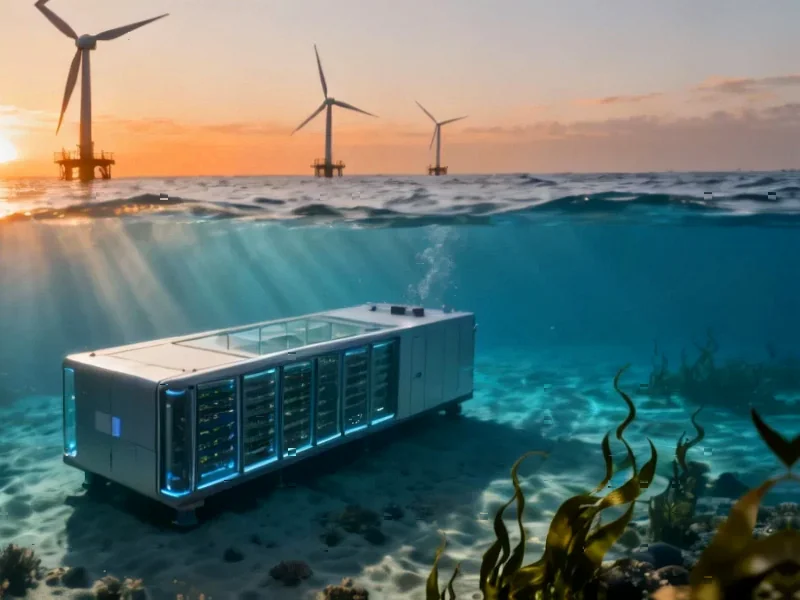The Nuclear Startup Defying Conventional Wisdom
In the high-stakes world of nuclear energy, one company stands out for its astronomical valuation despite having no operating reactors, no revenue, and no binding power contracts. Oklo, the Silicon Valley nuclear startup, has achieved a market valuation exceeding $20 billion, representing a staggering 500% increase since the beginning of the year. This unprecedented valuation comes as the company positions itself as a potential solution to the massive energy demands of artificial intelligence infrastructure.
Table of Contents
The husband-and-wife team of Jacob and Caroline DeWitte founded Oklo in 2013 after meeting at MIT, where both earned doctorates in nuclear engineering. Their vision centers on advanced small modular reactors (SMRs) that utilize liquid sodium cooling rather than traditional water-based systems. This technological approach, while promising significant advantages, has faced regulatory hurdles and technical skepticism from industry experts.
The Political Connections Drawing Scrutiny
Oklo’s rapid ascent has been facilitated by influential backers and political connections that have raised eyebrows in Washington. The company counts Sam Altman, the prominent technology executive, among its early investors and former board members. More controversially, Oklo maintains close ties to the Trump administration, particularly through Energy Secretary Chris Wright, who previously served on Oklo’s board.
These relationships have yielded tangible benefits. The Department of Energy has selected Oklo for multiple federal programs aimed at accelerating SMR development and nuclear fuel fabrication. Most notably, the department is considering providing Oklo with access to weapons-grade plutonium for fuel production—a decision that has drawn sharp criticism from Democratic lawmakers.
Senator Ed Markey has publicly questioned the arrangement, writing to President Trump that “I am concerned that your administration is moving forward with plans to transfer plutonium to Oklo… because Oklo stands to benefit financially and Secretary Wright is acting in his former company‘s interest.” The DeWittes have dismissed such concerns as “partisan bickering,” noting that Wright recused himself from decisions involving Oklo and that competitors have received similar government support.
Technical Challenges and Regulatory Hurdles
Oklo’s technological approach faces significant technical and regulatory challenges. The company‘s liquid sodium-cooled reactor design, while theoretically offering safety advantages through lower operating pressures, has a troubled history. Similar reactors built in the United States between 1950 and 1976 ultimately failed to achieve commercial viability.
Allison Macfarlane, former chair of the Nuclear Regulatory Commission (NRC), highlights the inherent risks: “Liquid sodium is highly corrosive, flammable and explosive on contact with air and water. Many countries have tried to build these reactors before but they haven’t managed to prove they are commercially viable at scale.”, according to market insights
The NRC rejected Oklo’s application to build a sodium-cooled reactor in 2022, a significant setback that the company characterizes as a temporary obstacle. DeWitte wrote at the time that the regulator’s action was “frustrating and even angering,” and has since alleged that NRC staff threatened retribution when Oklo challenged their findings.
The AI Energy Gold Rush
Oklo’s valuation surge reflects investor enthusiasm for companies positioned to serve the massive energy needs of artificial intelligence infrastructure. Data centers powering AI applications require enormous amounts of reliable electricity, and nuclear power offers a carbon-free solution that can operate continuously.
This positioning has attracted both enthusiastic retail investors—who comprise an unusually large proportion of Oklo’s shareholder base—and skeptical short sellers, who currently hold approximately 13% of the company’s stock. The volatility inherent in this dynamic has manifested in recent trading, with Oklo shares falling 25% over the past five sessions as concerns about its valuation mount.
Adam Stein of the Breakthrough Institute describes the situation as “a pretty classic technology hype cycle” and warns of a “bubble” in AI energy startups. “Most will never make it,” he predicts, highlighting the challenges of bringing advanced nuclear technology to market.
Financing Challenges in Advanced Nuclear
Oklo’s reliance on retail investors creates potential vulnerabilities, according to industry observers. Nick Touran, founder of the nuclear education website What is Nuclear, notes that “once you start running into trouble, those retail investors may get spooked, and they may run a lot faster than a traditional nuclear financing arrangement would.”
The DeWittes have capitalized on the stock’s rise, selling approximately 3.2 million shares over the past six months for proceeds of around $250 million. While such sales are common among executives of publicly traded companies, the timing and scale have attracted attention given Oklo’s pre-revenue status.
Despite these concerns, Oklo board member Michael Thompson argues that the valuation reflects the company’s potential. “The regulatory environment is far more conducive—for the first time in a very long time—to actually making these things real,” he says. “Capital feels more confident betting on these technologies.”, as earlier coverage
The Road Ahead
Oklo faces a critical juncture as it attempts to transition from concept to commercial operation. The company has broken ground on a pilot facility in Idaho and aims to deliver power to its first customers by 2027. However, it has yet to secure binding power purchase agreements, relying instead on non-binding memoranda of understanding with potential technology company customers.
DeWitte defends this approach, explaining that “people have been really wanting stuff signed. It’s just not in our interest to rush that until we can find the right partners and the right ways to do things.” He cites the rapidly evolving AI ecosystem as complicating long-term power agreements.
As Oklo navigates technical development, regulatory approval, and commercial deployment, it represents both the promise and perils of advanced nuclear energy. Its success or failure will have implications not just for its investors, but for the broader nuclear industry seeking to position itself as a solution to twenty-first-century energy challenges.
The company’s journey illustrates the complex interplay of technology, politics, and finance that characterizes advanced energy development. Whether Oklo can deliver on its ambitious vision—and justify its extraordinary valuation—remains one of the most compelling stories in the energy sector.
Related Articles You May Find Interesting
- Somerset’s Housing Surge: A Blueprint for UK Industrial Technology Demand?
- Oklo’s $20 Billion Nuclear Ambitions Face Regulatory and Market Scrutiny
- Barclays Shifts Capital Strategy with Early $670 Million Buyback Amid Mixed Q3 R
- Global Coalition Demands Moratorium on Artificial Superintelligence Development
- Advent International Eyes $2 Billion Exit from Luxury Fragrance Powerhouse Parfu
This article aggregates information from publicly available sources. All trademarks and copyrights belong to their respective owners.
Note: Featured image is for illustrative purposes only and does not represent any specific product, service, or entity mentioned in this article.



